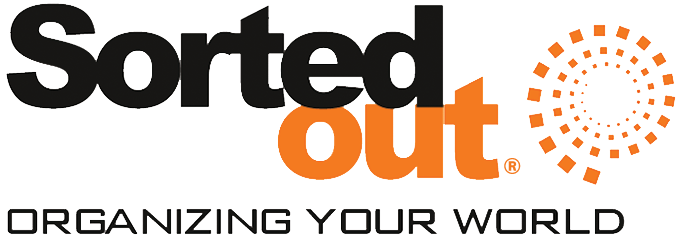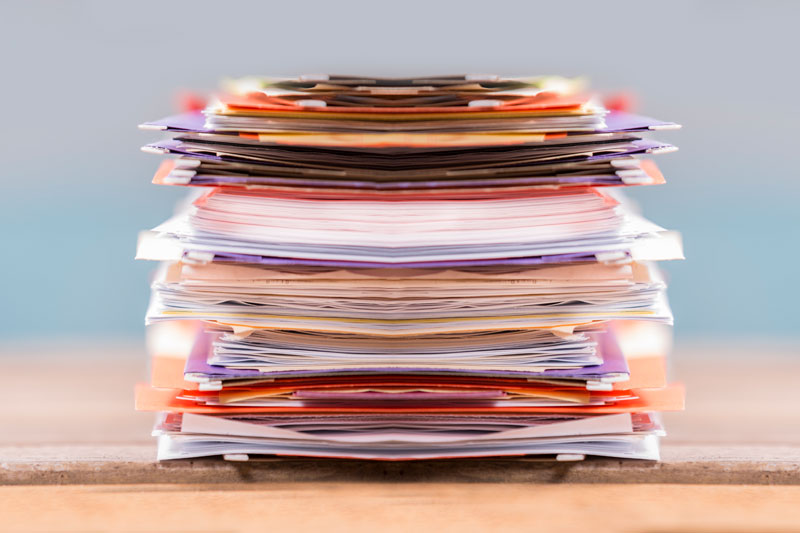Cull Paper Records to Fight Paper Overflow
If you are working from home regularly, or just needing a little help managing your home office files, we would like to offer some tips on how to keep your documents in order and help you decide if those papers are worth keeping, or if you’re better off tossing them out!
Even if your file cabinets aren’t overflowing, chances are you are saving WAY more than needed. Here are some tips on fighting document overflow:
State and Federal Income Tax Returns
Generally, you must keep your records that support an item of income, deduction or credit shown on your tax return until the period of limitations for that tax return runs out. The limitations period refers to the period after your return was filed and the time in which you can amend your tax return to claim a refund or credit. Any return filed before the due date are considered filed on the due date. Keeping copies of your filed tax returns will help you prepare future tax returns and make computations if you file an amended return.
A couple rules of thumb:
Keep for 3 years if:
- You have reported all income, filed a tax return, or if you have not filed a fraudulent return
- You filed a claim for a credit or refund after you filed a return, or keep for 2 years from the date you paid the tax (whichever is later)
Keep for 4 years:
- After the date the tax becomes due or is paid, whichever is later
Keep for 7 years if:
- You file a claim for a loss from securities that are not worth anything, or for a bad debt deduction
Keep indefinitely if:
- You did not file a return
- You filed a fraudulent return
Do not discard any records you no longer need until you have checked to verify you do not need them for other purposes. Example: If your insurance company or creditors require you to keep them longer than the IRS does.
Canceled Checks
Checks for home improvement projects should be saved as long as you own your home. Canceled checks for charitable contributions and other deductible expenses should be saved through that tax year. Keep checks for expensive purchases, such as jewelry, appliances, or antiques, as long as you own the items. If they are stolen or a warranty dispute arises, you can use the checks as proof of purchase.
Bank Statements
Keep bank statements until the end of the year, unless related for business or tax purposes.
Credit Card Bills
In most cases, you don’t need to save them longer than a month. When you receive a bill, it usually indicates whether your previous payment was received. If that information is correct, you don’t need to save the previous month’s bill. Exceptions: bills that document deductible expenses, such as home improvement purchases or other major purchases – such as appliances and jewelry. If you can’t find the sales slip your credit card bill will provide proof.
Pay Stubs
Keep them until you get your year-end W2 form. Your final pay stub each year should be kept indefinitely, to give you a handy record of your earnings and deductions.
Home Mortgage Information
Keep a copy of your mortgage paperwork in a safe place for as long as you own your home. Mortgage bills can be discarded once you have received confirmation of payment. Most mortgage companies provide a year-end summary. Keep all old Deeds from previous homes.
Stock Records
Save the “buy” and “sell” records for as long as you own the stock, so you will have record of how much you own in capital gains when you go to sell the stock. Also, save any monthly statements showing reinvested dividends, stock splits & any other changes in your investment. Once you’ve received your year-end summary statement, you can discard your monthly statements.
Mutual Fund Statements
The same rules apply here, as with stock records. If your mutual fund statements are cumulative, discard last month’s statement as soon as you get the current month’s report. Keep year end statements indefinitely. For both mutual funds and stocks, discard all but the most recent shareholder reports. Keep confirmation receipts for cost basis.
Disclaimer: Be sure to consult with your financial advisor or tax professional to ensure compliance with requirements imposed by the IRS. These are simple guidelines intended to help with consolidating your paperwork & personal files, prepared for informational purposes only, and should not be relied on for tax, legal or accounting advice. Sorted Out®, LLC does not provide tax, legal or accounting advice. You should consult with your own financial advisors or tax professionals for such advice and before engaging in any transactions or acting upon information provided online. We will not be held accountable for legal litigations or lawsuits.
Items to be Kept Safely
Some documents are too valuable to stash in a filing cabinet or kitchen drawer. Although your home office filing cabinets are a great place to keep COPIES of your important documents, you should never keep the originals there. All original documents should be kept in a lockbox or safe for added security.
Important Documents Include:
- Birth Certificates
- Citizenship Papers and Passports
- Deeds to Property; Mortgage Notes
- Marriage Licenses and Divorce Decrees
- Military Discharge Records
- Social Security Cards.
- Stock Certificates (if your broker doesn’t keep them for you)
- Automobile Titles
- Wills and Trusts (make sure the executor and/or your attorney have a copy)
- Powers of Attorney (make sure the executor and/or your attorney have a copy)
Ready to get Organized?
Book a Call with Julie!
Request a Consultation
There are so many ways that organization can help take back a space that is overwhelming and bring it to functional!
We are excited to help start your journey to an organized and productive space.






